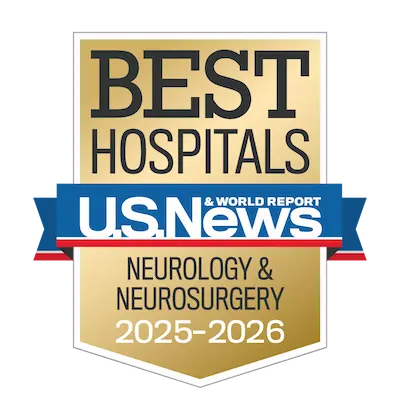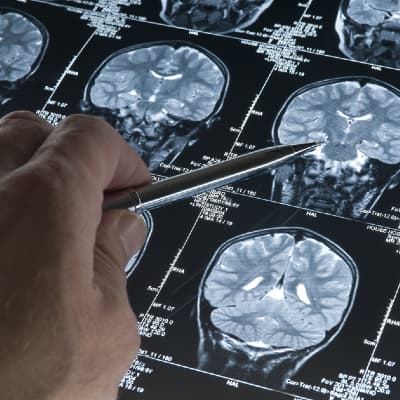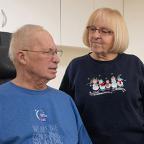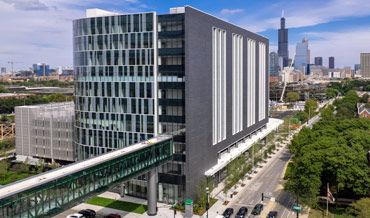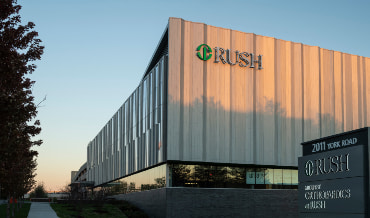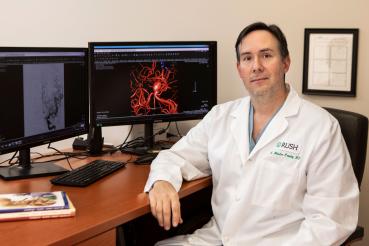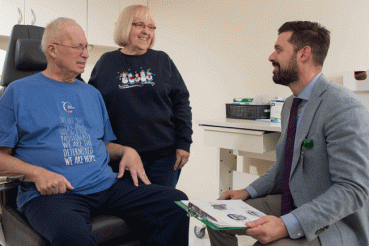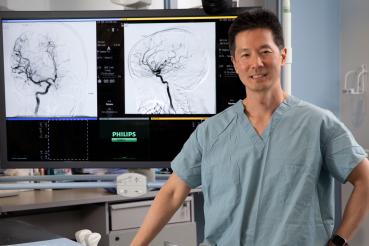The RUSH Approach to Cerebrovascular Neurosurgery
Cerebrovascular neurosurgery involves surgery to repair the blood vessels leading to and in your brain. It can treat many problems, including narrowing of the arteries, aneurysms, malformations or fistulas. Sometimes repairing these issues can involve open or “traditional” surgery where the surgeon makes an incision and may have to temporarily remove part of the skull to get to an artery from outside of the body. Other procedures, referred to as "neuroendovascular" or "neurointerventional," can be performed from within the blood vessels using catheters instead of open surgery.
This repair of blood vessels may happen in emergency situations, such as strokes or ruptured brain aneurysms, or as planned treatment when a problem is found through routine scans. Cerebrovascular neurosurgeons at the RUSH Cerebrovascular and Endovascular Neurosurgery Center in Chicago and at RUSH Oak Brook can often provide care in multiple ways — through traditional, or "open," surgeries or through the blood vessels in minimally invasive procedures.
This expertise allows them to customize their approach for each patient's needs.
They also work closely with neurologists and other cerebrovascular specialists to make sure you're getting multiple points of view on the most appropriate care.
Second Opinions for Cerebrovascular Neurosurgery at RUSH
There are many reasons you might want a second — or even third or fourth — opinion before you get cerebrovascular neurosurgery. A diagnosis for a potentially serious condition, like a brain aneurysm or stroke, is concerning, and there can be many possible options for treatment. Learning more about those options can give you confidence in making a decision about your care.
If you’d like a second opinion on your cerebrovascular care, call RUSH at (888) 352-7874. You can also visit our page on scheduling an appointment at RUSH for more information.
RUSH Excellence in Cerebrovascular Neurosurgery
- Radial artery (wrist) access: RUSH cerebrovascular neurosurgeons in Chicago often use the radial artery in your wrist to gain access to blood vessels instead of an artery in your groin, which has been the traditional approach. Using an artery in the wrist may mean a faster recovery and a less stressful experience for patients. Neurosurgeons at RUSH were the first in the world to use a catheter designed to treat neurological conditions from the wrist.
- Multiple ways to perform procedures: Our cerebrovascular neurosurgeons can perform procedures in multiple ways, whether open or through the blood vessels, or while someone is awake or under general anesthesia. This allows them to tailor how they perform the procedure to your specific situation — and for non-emergency procedures, to your preferences.
- Advanced technology during surgery: For many complex cases, we use a hybrid operating room and angiography imaging suite at our Chicago location. For instance, during a brain aneurysm clipping procedure, we can take an image of your blood vessels, called an angiogram. This helps us make sure the clip is secure and working properly for a smoother recovery.
- Team approach to treatment: Our cerebrovascular neurosurgeons in and around Chicago discuss multiple options as part of their team approach. For example, with some conditions, the decision whether to continue medical therapy or proceed with surgery can be tricky. Your care team helps you with that decision by sharing opinions and working together with experts in different fields.
- Continual improvement through research: RUSH has been offering cerebrovascular neurosurgery services to patients in Chicago and the surrounding areas for decades, and care has become more targeted and specialized in that time. Cerebrovascular neurosurgeons are continually investigating ways to improve care through clinical trials and other research. From investigating new treatments for wide-neck aneurysms to exploring faster and more inclusive treatments for stroke, their focus is always on providing the safest, most effective care possible.
- Leaders in new tests and treatments: Our neurosurgeons are experts in using a new device called the Woven EndoBridge (WEB). It allows some aneurysms to be treated with minimally invasive techniques when the prior best option may have been a full craniotomy. Some members of our team even train other neurosurgeons to use the device. RUSH was also the first in Chicago to use a robotic system during cerebral angiograms.
- Expertise in reducing your stroke risk: If you’ve been diagnosed with a cerebrovascular condition such as an arteriovenous malformation (AVM) or carotid artery disease, you may be at increased risk of having a stroke. The team at RUSH’s comprehensive Stroke-Neurosurgery Clinic can create a custom treatment plan to prevent future strokes. They’ll use their expertise in the full range of medications, surgery, minimally invasive procedures and risk reduction strategies to select the approach that works best for you.
- Leading experts: Rush's neurosurgeons are among the best doctors in Chicago. Many Rush cerebrovascular neurosurgery experts are named "Top Doctors" by Castle Connolly, a recognition voted on by fellow doctors for exceptional patient care.
FAQs About Cerebrovascular Neurosurgery
Endovascular neurosurgery refers to surgery that happens within the blood vessels. Physicians use catheters and live imaging to diagnose conditions and provide treatment from within, rather than through open surgery. While no procedure is risk-free, it is considered more minimally invasive because it is performed through a small needle puncture rather than requiring an incision.
When it comes to medical treatment, the word “vascular” refers to any care for the veins, arteries and blood vessels in the body. The term “cerebrovascular” specifically refers to the blood vessels in and leading to the brain.
Some of the most common signs and symptoms people have with neurovascular conditions include the following:
- Numbness or weakness on half of the body
- Trouble talking or understanding people
- Loss of vision or change in vision
- Slurring of words
- Vertigo or dizziness
- Severe headaches
- Severe headaches
While it may be easy to diagnose neurovascular problems when they cause symptoms, many patients with neurovascular problems do not have symptoms. Some are even born with conditions that they are not aware of and are only diagnosed later in life. Their conditions are often found when they come in for an unrelated scan or test. For example, an ultrasound or angiogram for heart conditions can reveal neurovascular issues, as can an MRI performed for headaches.



